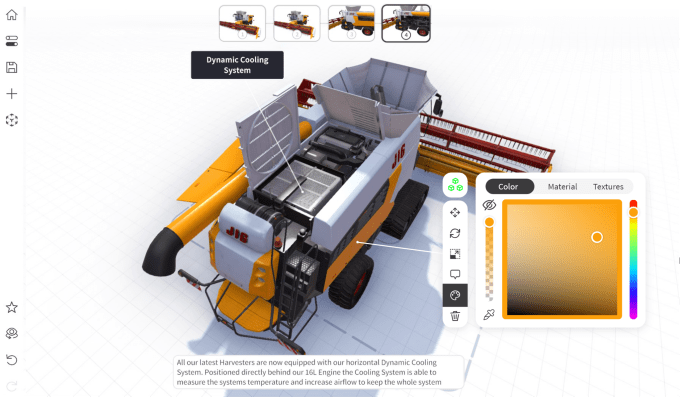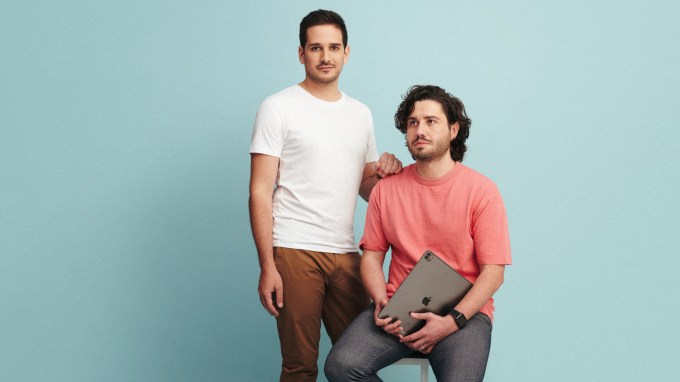When former Art Director Zac Duff started teaching a game development course online in 2015, he faced the same challenges that teachers around the globe have become all too familiar with after a pandemic-induced lockdown. So, he used his experience in 3D design to build a virtual reality classroom to make remote learning more engaging for his students. Instead of entering yet another Zoom lecture, the school gave students VR headsets to transport themselves to the Ancient Greek-inspired classroom that Duff built.
Still, Duff knew that this learning model couldn’t be easily scaled — most schools don’t have VR headsets to send out, and most teachers don’t have over a decade of game design experience to whip up a classroom with green fields and butterflies (yes, Duff made that). But he saw that there was potential for a user-friendly program that lets anyone create 3D presentations and share information in AR.
“Right at the center of it is knowledge transfer. It’s about one person giving knowledge to another person in a really effective way,” Duff told TechCrunch. He referenced products like Microsoft Powerpoint and Canva, which make it easy for the average user to create presentations and graphics that communicate their ideas. “We have those systems in 2D, but in 3D, we just didn’t have it, and it was a really complex, expensive technical process that you had to go through to build anything, and that stuck with me.”

Image Credits: JigSpace
Soon after, Duff took a Friday off from work to outline the company that would become JigSpace, which is poised to set the standard for knowledge-sharing in 3D. After launching in 2017, the JigSpace platform now has over 4 million users with a 4.8 average rating on the App Store. When you download the JigSpace app, you can interact in AR with 3D models that show how to fix a leaky sink, repair a dry wall, or even build a Lego Star Wars spacecraft. There are also educational models, or Jigs, that show how a piano works, the anatomy of the human eye, and even how the coronavirus spreads. The potential use cases for JigSpace are expansive — Duff says he hopes to work with manufacturing companies to have them make Jigs of their products. That way, let’s say you want to replace your AC filter, you can look at a 3D model in AR, rather than a black and white 2D drawing in an instruction booklet.
Today, JigSpace announced that it raised $4.7 million in Series A funding led by Rampersand, with Investible and new investors including Vulpes, and Roger Allen AM, also participating. The JigSpace app is free to use, and anyone can combine presets and templates of 3D modeled objects to create their own Jigs — the more tech savvy among us can upload up to 30 MB of files to make more customized Jigs on the free version. But the money-maker for Jigspace is its Jig Pro platform, which is designed for commercial businesses and manufacturers. Jig Pro‘s subscription for individuals is $49 per month, while the price of the enterprise offering isn’t listed online.

Image Credits: JigSpace
“The best area for us has been in durable manufacturing, because almost all manufacturing products have CAD files, so the 3D already exists,” said Duff. “Then, we’re able to work with those companies to give them the tools to create knowledge material around their products.”
Right after JigSpace launched its Pro version, it was featured in Apple’s iPhone 12 Keynote, demonstrating how the iPhone 12’s LiDAR scanner and 5G capabilities could be used to save time and money in manufacturing. JigSpace also partnered with Snapchat to create a Lens that allows you to scan kitchen items to reveal 3D Jigs that show how stuff works, from your microwave to your coffee maker.
Jig Pro’s customer base has grown 40% month-on-month since it launched in mid-2020, with the average user logging into the app at least once per day. Companies like Verizon, Volkswagen, Medtronic, and Thermo Fisher Scientific use JigSpace to develop 3D models to present to stakeholders, customers, and remote colleagues. Especially as products like Apple’s Capture emerge, it will become even easier for people to import their own 3D models into JigSpace.
Despite its commercial potential, it’s important to Duff that JigSpace always retains a free version that makes learning through AR easy.
“We want to make sure that all of the people with information they want to share, those are the people we serve, not just the technical people at the top,” Duff says. “From the beginning, my co-founder Numa Bertron and I always wanted to have a free version. Knowledge should be accessible to people in the best way possible, and there’s no reason why it shouldn’t be.”
Comments
Post a Comment